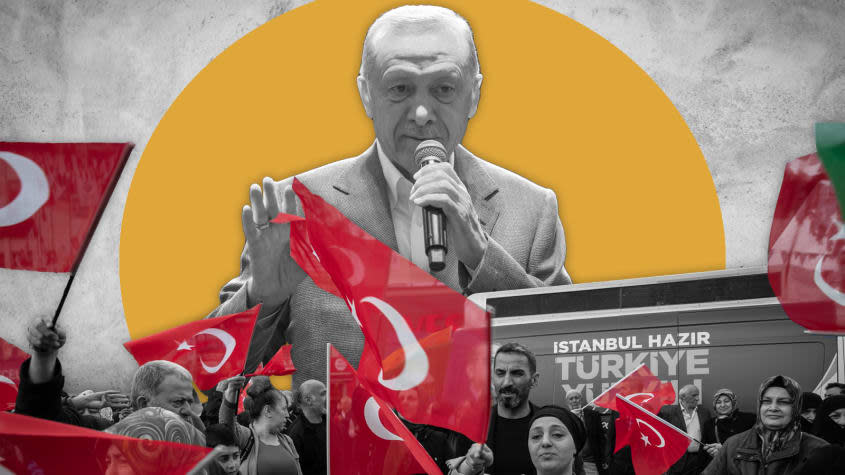What would change if Erdogan lost Turkey's presidential election?

- Oops!Something went wrong.Please try again later.
- Oops!Something went wrong.Please try again later.
Turkish President Recep Tayyip Erdogan faces "his greatest electoral challenge yet" in the May 14 presidential election against opposition leader Kemal Kilicdaroglu, the Financial Times reports. Erdogan is a "charismatic strongman who has towered over the country's politics for two decades," but his rule has been undermined by a cost-of-living crisis and his government's fumbling response to a devastating February earthquake that killed more than 46,000 people.
The results of the election may reverberate throughout the region. Under Erdogan, "Turkey's role as a regional and international power broker has grown substantially," The Washington Post reports. But the race is expected to be close. "Erdogan controls most major media outlets and is a highly effective campaigner," notes Axios. Why is Erdogan facing possible ouster? And what might it mean for the rest of the world?
Who is Recep Tayyip Erdogan?
He is Turkey's longest-serving leader — "surpassing even Mustafa Kemal Ataturk, founder of the modern Turkish republic," the Post reports. He became prime minister in 2003 at the head of a moderate Islamist movement called the Justice and Development Party (AKP), then became president in 2014. In 2017, he spearheaded a referendum that abolished Turkey's parliamentary system — including the prime ministership — and concentrated governmental powers in his office. He has used those powers to crack down on the critics, press, social media, and the country's LGBT community, banning pride parades in 2015. Those efforts sparked criticism from Human Rights Watch, which in 2021 said Erdogan "is dismantling human rights protections and democratic norms in Turkey."
Who is Erdogan's opponent?
Kemal Kilicdaroglu was picked in March to represent six opposition parties that have allied for this election, The Associated Press reports. He leads the "pro-secular, center-left" Republican People's Party (CHP). The 74-year-old is often described as a "former bureaucrat," one who has promised a return to democratic norms — but also has pledged to deport millions of Syrian and Afghan refugees living in Turkey. "As the polarizing Erdogan has grown increasingly authoritarian," AP adds, "Kilicdaroglu has built a reputation as a bridge builder and vows to restore democracy."
What are the issues in the Turkish presidential race?
The government's slow and ineffective response to the February earthquakes has been the catalyzing force in this election, the New Yorker reports. In a televised broadcast the day after the disaster, Erdogan expressed anger at complaints about that response, then briefly shut down Twitter across the country. That sparked his present problems. The magazine adds: "The earthquakes highlighted a two-pronged failure — the failure to prepare and the failure to respond — that was rooted in the A.K. Party's decades-long reign."
Inflation is another big issue: Reuters reports that the inflation rate was measured at nearly 44 percent in April — and that actually reflected a slowing down of price hikes across the country. "The cost of living crisis has eaten away at household savings and also at Erdogan's popularity ahead of the presidential and parliamentary votes on May 14."
Who is winning?
Several polls show Kilicdaroglu with a narrow lead. But it's not clear that means he'll win the election. Erdogan still controls the levers of power, after all. "This year, the AKP has a wide array of tactics it could employ to shape the election outcome, including recent changes to electoral laws, persecution of the opposition, arbitrary criminalization of speech, and a surge in public spending to win over voters," Foreign Policy reports. That means domestic and international election observers need to keep an eye out for the possibility of the government "meddling with the results or violently suppressing protests in the case of a contested outcome."
What would change if Erdogan is defeated?
Potentially a lot. The Economist reports on some likely changes: Kilicdaroglu has pledged to restore independence to the country's central bank, which has fueled the skyrocketing inflation with Erdogan-mandated interest rate cuts. He has also promised to restore power to the parliament and Turkey's judiciary. Abroad, Kilicdaroglu's aides have suggested Turkey's opposition to Sweden joining NATO might end if he wins the election. But Turkey is nonetheless expected to maintain "cordial relations" with Russia no matter who wins.
What's next?
Perhaps two rounds of voting. Presidential candidates must win at least half the vote in Turkey, Al Jazeera reports. If nobody reaches 50 percent, "the top two candidates will go head to head in a run-off vote two weeks later."
You may also like
DeSantis bans Chinese citizens from buying land in Florida
Researchers discover submerged cemetery and hospital off the Florida coast
Norway's near-total adoption of electric vehicles appears to be going smoothly, defying skeptics

